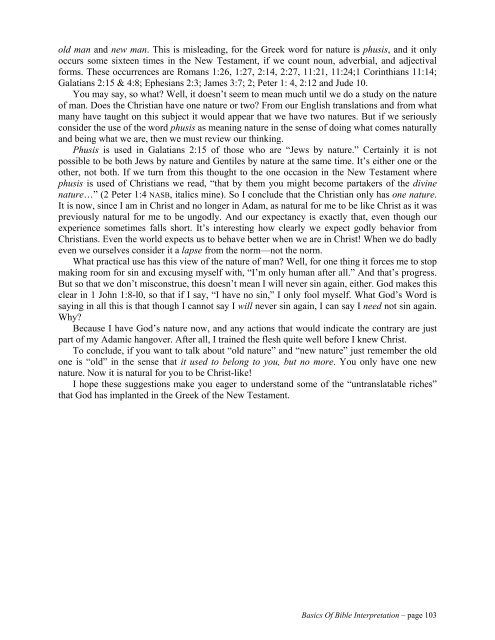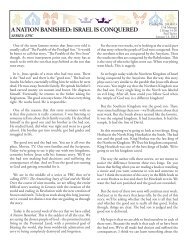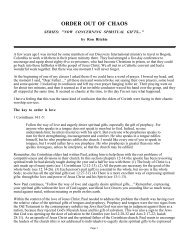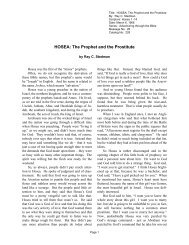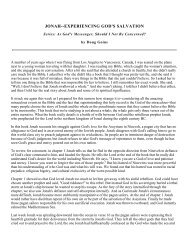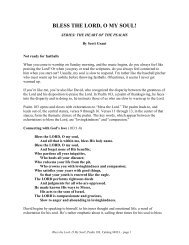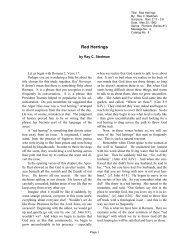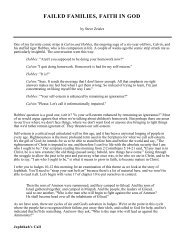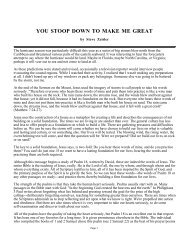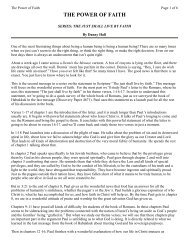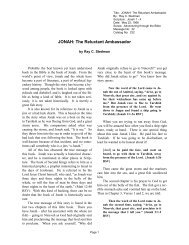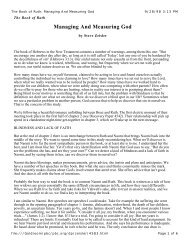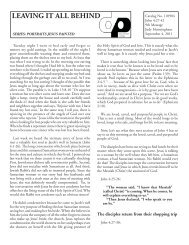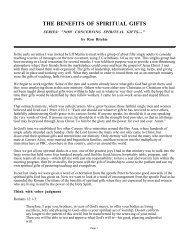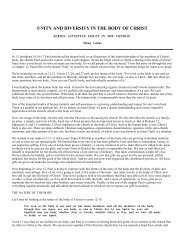Basics of Bible Interpretation - RayStedman.org
Basics of Bible Interpretation - RayStedman.org
Basics of Bible Interpretation - RayStedman.org
You also want an ePaper? Increase the reach of your titles
YUMPU automatically turns print PDFs into web optimized ePapers that Google loves.
old man and new man. This is misleading, for the Greek word for nature is phusis, and it only<br />
occurs some sixteen times in the New Testament, if we count noun, adverbial, and adjectival<br />
forms. These occurrences are Romans 1:26, 1:27, 2:14, 2:27, 11:21, 11:24;1 Corinthians 11:14;<br />
Galatians 2:15 & 4:8; Ephesians 2:3; James 3:7; 2; Peter 1: 4, 2:12 and Jude 10.<br />
You may say, so what? Well, it doesn’t seem to mean much until we do a study on the nature<br />
<strong>of</strong> man. Does the Christian have one nature or two? From our English translations and from what<br />
many have taught on this subject it would appear that we have two natures. But if we seriously<br />
consider the use <strong>of</strong> the word phusis as meaning nature in the sense <strong>of</strong> doing what comes naturally<br />
and being what we are, then we must review our thinking.<br />
Phusis is used in Galatians 2:15 <strong>of</strong> those who are “Jews by nature.” Certainly it is not<br />
possible to be both Jews by nature and Gentiles by nature at the same time. It’s either one or the<br />
other, not both. If we turn from this thought to the one occasion in the New Testament where<br />
phusis is used <strong>of</strong> Christians we read, “that by them you might become partakers <strong>of</strong> the divine<br />
nature…” (2 Peter 1:4 NASB, italics mine). So I conclude that the Christian only has one nature.<br />
It is now, since I am in Christ and no longer in Adam, as natural for me to be like Christ as it was<br />
previously natural for me to be ungodly. And our expectancy is exactly that, even though our<br />
experience sometimes falls short. It’s interesting how clearly we expect godly behavior from<br />
Christians. Even the world expects us to behave better when we are in Christ! When we do badly<br />
even we ourselves consider it a lapse from the norm—not the norm.<br />
What practical use has this view <strong>of</strong> the nature <strong>of</strong> man? Well, for one thing it forces me to stop<br />
making room for sin and excusing myself with, “I’m only human after all.” And that’s progress.<br />
But so that we don’t misconstrue, this doesn’t mean I will never sin again, either. God makes this<br />
clear in 1 John 1:8-l0, so that if I say, “I have no sin,” I only fool myself. What God’s Word is<br />
saying in all this is that though I cannot say I will never sin again, I can say I need not sin again.<br />
Why?<br />
Because I have God’s nature now, and any actions that would indicate the contrary are just<br />
part <strong>of</strong> my Adamic hangover. After all, I trained the flesh quite well before I knew Christ.<br />
To conclude, if you want to talk about “old nature” and “new nature” just remember the old<br />
one is “old” in the sense that it used to belong to you, but no more. You only have one new<br />
nature. Now it is natural for you to be Christ-like!<br />
I hope these suggestions make you eager to understand some <strong>of</strong> the “untranslatable riches”<br />
that God has implanted in the Greek <strong>of</strong> the New Testament.<br />
<strong>Basics</strong> Of <strong>Bible</strong> <strong>Interpretation</strong> – page 103


